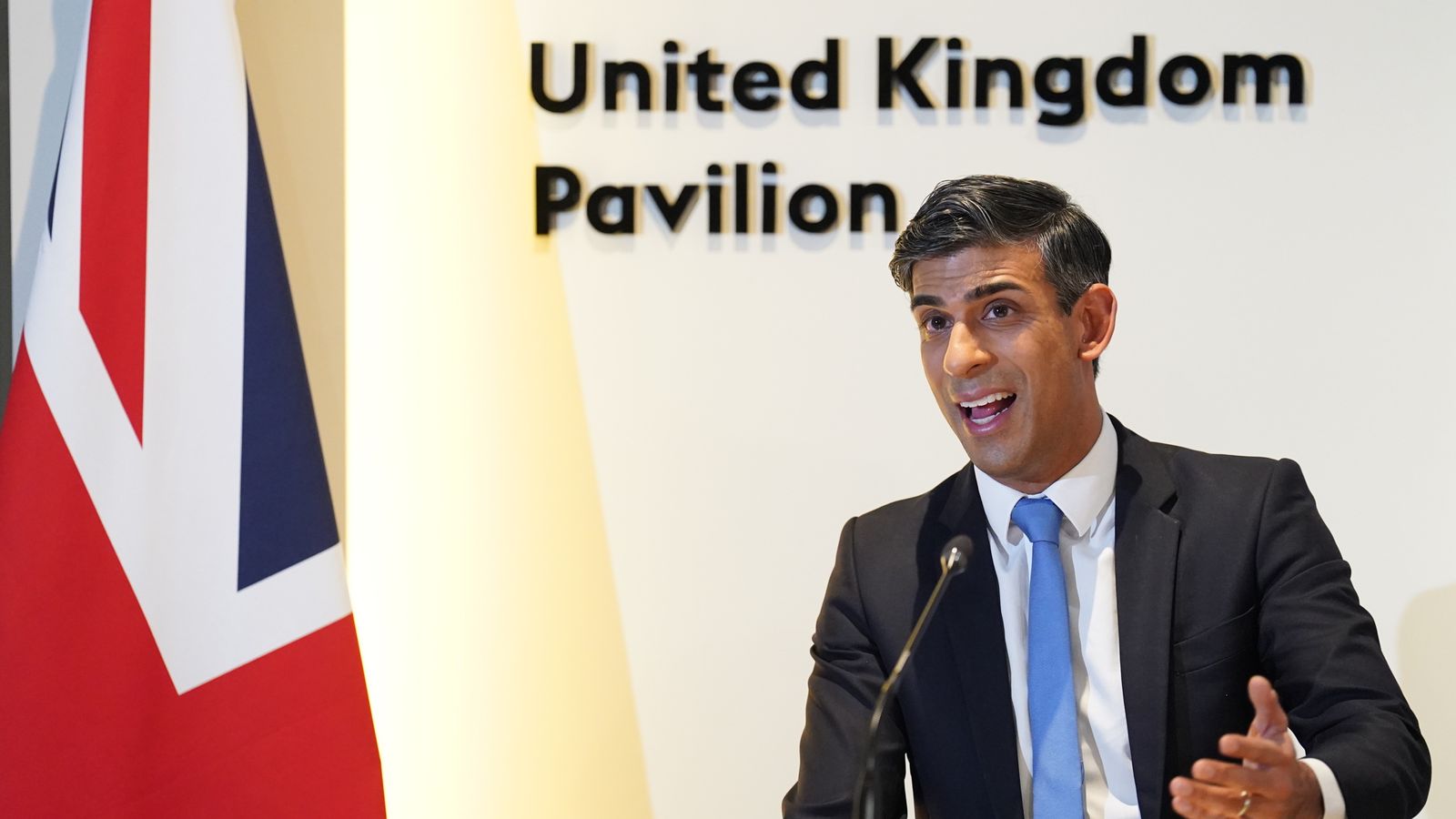Rishi Sunak has insisted none of his fellow world leaders at a major climate change summit have taken him to task over scaling back plans to tackle global warming.
Defending the UK’s environmental record at the COP28 conference in Dubai, the prime minister said the country remained on course to meet its carbon reduction targets while adopting a “pragmatic” approach that would save families thousands of pounds.
He said the fierce criticism he has faced at home over the weakening of pledges designed to help the UK reach net zero by 2050 highlighted “just how distorted this debate has become”.
Mr Sunak ended his visit by announcing a deal between energy firms Masdar and RWE to invest up to £11bn in the UK’s new wind farm at Dogger Bank, which will be the biggest in the world.
He said: “This is a huge boost for UK renewables, creating more jobs, helping to power three million homes and increasing our energy security.”
In addition, he confirmed the UK government will commit £1.6bn for international climate finance projects, including to support projects to halt deforestation and accelerate the transition to renewable energy.
But the Tory leader’s recent shift in green policy has been controversial.
In September, he delayed the ban on new diesel and petrol cars to 2035, watered down plans to strip out polluting gas and oil boilers, and scrapped the requirement for energy efficiency upgrades for homes, arguing hitting climate targets should not burden the public.
Please use Chrome browser for a more accessible video player
Mr Sunak has also promised to “max out” the UK’s oil and gas reserves by granting new North Sea drilling licences, while facing accusations from within his own party of undermining the UK’s standing.
Read more on Sky News:
COP28 a ‘critical turning point’ in climate fight, says King
What is COP28 and why is it controversial?
UK claims to be climate leader, but is it ‘fuelling’ crisis?
Pressed by Sky News over whether these changes had been an issue at the summit, Mr Sunak said: “Hand on heart, 100%, no – not a single leader that I have spoken to today has spoken about that.
“Do you know why? Because most of their targets are less ambitious than the UK’s.”
Please use Chrome browser for a more accessible video player
He argued the new timescale to phase out internal combustion engine vehicles simply brought the UK in line with other European nations.
Mr Sunak said: “I shift a date to be in line with basically every other country and it’s somehow portrayed as some extreme measure.”
Political correspondent
Rounding off a rapid day of climate diplomacy, Rishi Sunak looked somewhat bleary-eyed as he took to the podium for a final press conference before leaving COP28.
That’s hardly surprising.
When he arrives back in London later this evening, he’ll have spent more time on his plane than he did at the summit.
But the prime minister insists his ambition for the global climate outstrips the fleeting nature of his visit.
It’s this question that’s followed him around Dubai today though.
How can a leader credibly call for other countries to do more when changes he’s made mean the UK is arguably doing less?
Mr Sunak’s answer is essentially we are still pulling our weight compared to other nations.
When asked by Sky News if anyone had raised the recent policy changes with him the prime minister was emphatic – “hand on heart, no”.
He said the fact that hadn’t registered on the global stage was proof that the debate around climate policies had become “polarised by the extremes” in the UK.
The problem is it’s not just the “ideological zealots” – as the PM puts it – who are accusing the UK of abandoning its obligations.
Mr Sunak’s former cabinet colleague and the Glasgow COP26 president Sir Alok Sharma has concerns, as do Theresa May and Lord Zac Goldsmith.
The change in policy also opens up another potential crack for Labour to attack the government on.
Sir Keir Starmer flew to COP28 as well, attempting to play prime minister in waiting and telling reporters he’s had more requests for meetings than he can possibly accommodate.
Mr Sunak heads back to London no doubt with other big domestic issues at the forefront of his mind.
But that pressure at home can have a knock on impact abroad .
He added: “You won’t find another major economy that’s got a more ambitious reduction target for 2030 than the UK.
“The other bit of good news I can give you is we’re on track to deliver all these targets. We’ve already had carbon budgets that we’ve met and we’re on track to meet the next one as well, and with all the changes that I made earlier we are still on track to meet all of those emissions targets that I’ve just set out.
“So that’s my point, we can meet targets that are already more ambitious than anyone else’s but we can do so in a more pragmatic way that saves families, five, 10, 15 thousand pounds.”
Click to subscribe to ClimateCast with Tom Heap wherever you get your podcasts
Tackled over how seriously he was taking the summit, given he was spending as much time there as the 11-hour flight over, Mr Sunak said: “I wouldn’t measure out impact here by hours spent, I would measure it by the actual things that we’re doing that are making a difference.
“And as I said, the conversations that I’ve been having with people are incredibly positive.”
He added: “I’m actually very confident that what we’ve achieved here is significant. We’ve set out our stall, demonstrated our, I think, both moral and practical leadership on this issue and furthered the agenda in ways that we can make a difference – loss and damage being another example.”
Sir Keir Starmer also attended the conference to stress that Britain would be open to green investment under a Labour government and position himself as a prime minister in waiting.
The opposition leader said: “I think that the prime minister is one of the people who is trying to polarise the debate.
“When you come to an international conference like this, it’s about casting aside differences and showing global leadership.
“Every single country in the world needs to do more. If we don’t hit these targets on climate, it’ll be a disaster which is measured in floods, in fires, in all sorts of catastrophes across the world.”









